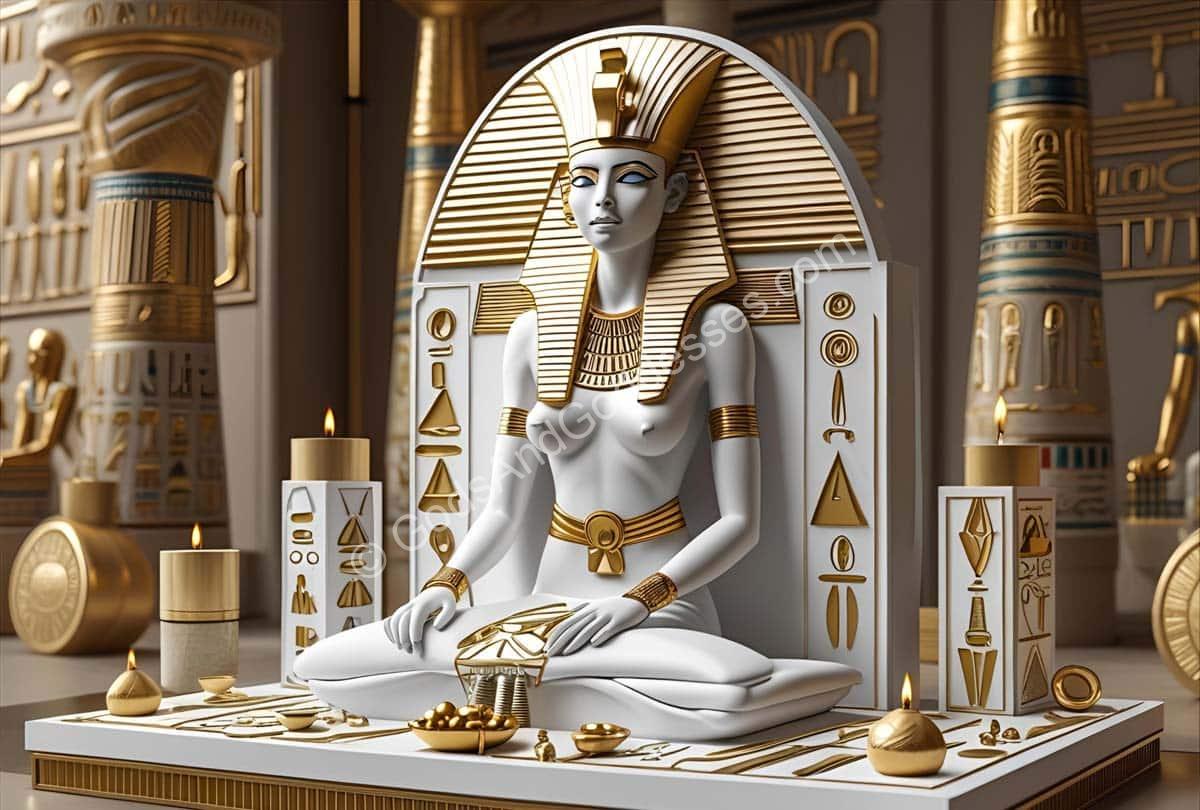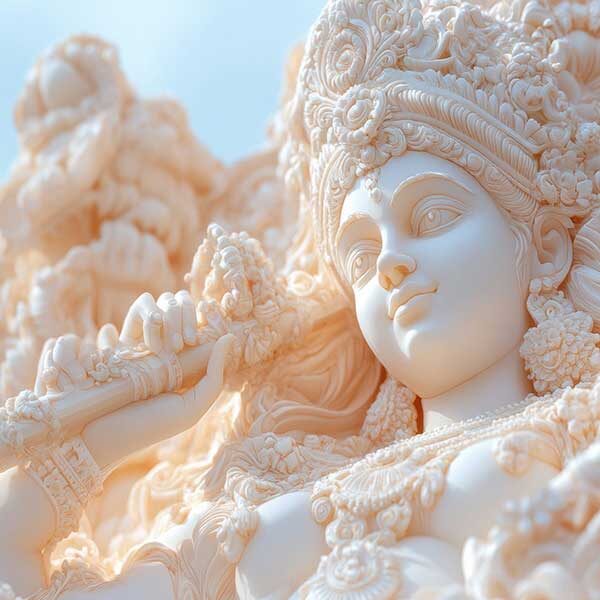Introduction: Why Offerings to Isis Still Matter
Worshiped as the goddess of magic, motherhood, healing, and protection, the goddess Isis, known as Aset in ancient Egypt, is one of the most beloved and enduring deities in world mythology. She was honored for thousands of years along the Nile and later across the Mediterranean.
At GodsAndGoddesses.com, we explore not only goddesses themselves but also the practices of goddess worship that brought them alive. From the grand temples at Philae and Abydos to simple household shrines, offerings to Isis secured blessings of healing, fertility, and divine protection. Even today, modern seekers continue to honor her through rituals, meditation, and daily devotion.
“To offer to Isis is to honor love that endures, magic that heals, and power that restores.”
At GodsAndGoddesses.com, we explore Mythology, Gods, and Goddesses.
Key Takeaways
-
Isis was one of the most widely worshipped deities in Egypt and the Mediterranean.
-
Ancient offerings included bread, beer, milk, honey, incense, flowers, and libations.
-
Household rituals were just as important as temple ceremonies for her worshippers.
-
Offerings symbolized living exchanges of energy between humans and the gods.
-
Modern practices adapt these traditions through altars, symbolic gifts, chanting, and acts of compassion.
Why Offerings to Isis Matter
For the ancient Egyptians, offerings were not symbolic—they were living exchanges between humans and gods. Food, water, incense, flowers, and prayers carried real energy, believed to sustain the gods in return for protection and blessings.
Isis, as the great mother and magician, received offerings:
-
For healing and fertility
-
To protect children and mothers
-
To seek wisdom, justice, and magical aid
-
To honor her as the eternal mother of Horus and queen beside Osiris
See also: Isis: Egyptian Goddess of Magic and Motherhood
Traditional Offerings to Isis in Ancient Egypt
Food and Drink
-
Bread and beer were common offerings, staples of Egyptian life.
-
Milk and honey symbolized nourishment and sweetness, appropriate for the great mother goddess.
-
Wine, figs, and dates were considered luxury offerings.
Flowers and Plants
-
Lotus flowers symbolized rebirth and divine creation.
-
Papyrus was sacred to the Nile and Isis’s connection to wisdom.
Incense and Perfume
Burning frankincense, myrrh, or kyphi incense was central in Egyptian rituals. The smoke carried prayers upward, symbolizing purification and transformation.
Ritual Practices in Temples
In Isis’s temples, priests and priestesses conducted daily rituals to awaken her presence:
-
Purification – cleansing of the temple and participants.
-
Invocation – chanting hymns and prayers to call on Isis.
-
Offerings – food, flowers, incense, and sacred objects placed on the altar.
-
Libations – pouring water or wine in her honor.
-
Closing prayers – sealing the ritual with blessings of healing and protection.
These temple practices reinforced Isis’s role as both mother and magician—the one who could heal, resurrect, and empower.
See also: God Symbols
Household Offerings to Isis
Not all worship took place in grand temples. Egyptians also honored Isis in their homes with simple offerings:
-
Lighting a small oil lamp as her flame.
-
Placing bread, fruit, or milk on a small shrine.
-
Offering a cup of water—sacred to Isis’s healing power and the Nile itself.
-
Reciting prayers or hymns passed down orally or written on papyrus.
Household rituals ensured Isis’s protection over the family, especially women and children.
Modern Ways to Honor Isis
Today, Isis is revered in neo-paganism, goddess spirituality, and Wicca as a universal goddess of love, magic, and renewal. You can honor her in ways that echo ancient tradition:
-
Create an altar – with candles, a bowl of water, and a lotus or rose.
-
Make symbolic offerings – bread, wine, honey, milk, or incense.
-
Chant her names – “Aset,” “Isis,” or “the one with ten thousand names.”
-
Offer creative acts – writing, song, or art inspired by her myths.
-
Practice compassion – acts of service or healing are offerings in her spirit.
See also: Goddess Worship and Rituals
Sample Ritual to Isis
-
Prepare the Space – cleanse with incense, water, or salt.
-
Set the Altar – light a candle (her eternal flame), place a bowl of water, and add bread, fruit, or flowers.
-
Invocation – say:
“Isis, great mother, healer, and magician, I call to you. May your wings shelter me, may your love sustain me, may your magic renew me.”
-
Offerings – place your gifts on the altar, pouring water or wine as libation.
-
Meditation or Prayer – focus on healing, protection, or inspiration.
-
Closing – thank Isis, extinguish candles, and share food in her honor.
FAQs About Offerings to Isis
What is the best offering for Isis?
Water, milk, bread, and flowers were common in antiquity, but modern devotees also offer incense, wine, or creative acts like poetry.
Do offerings need to be elaborate?
No. Even a simple candle and heartfelt prayer can honor her.
Can Isis be honored outside Egypt?
Absolutely. Her cult spread across the Mediterranean in antiquity, and today she is worshipped globally in goddess traditions.
Conclusion
To make an offering to Isis is to connect with one of the most powerful and enduring goddesses of all time. She is the mother who heals, the magician who transforms, and the queen who guides. Whether you honor her with bread and milk, flowers and incense, or simple acts of devotion, the spirit of Isis responds to love and intention.
Explore more:
“Isis is not bound by time or place. She is the eternal mother, the flame of magic, and the healing water that never runs dry.”
- Odin God Story - August 24, 2025
- The Story of Ra: Egyptian Sun God and Creator - August 24, 2025
- Kraken: Mythological Sea Monster of the Deep - August 24, 2025




